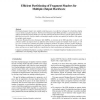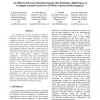5 search results - page 1 / 1 » Efficient partitioning of fragment shaders for multiple-outp... |
EGH
2004
Springer
13 years 8 months ago
2004
Springer
Partitioning fragment shaders into multiple rendering passes is an effective technique for virtualizing shading resource limits in graphics hardware. The Recursive Dominator Split...
EGH
2004
Springer
13 years 10 months ago
2004
Springer
Real-time graphics hardware continues to offer improved resources for programmable vertex and fragment shaders. However, shader programmers continue to write shaders that require ...
CGF
2010
13 years 5 months ago
2010
We present a flexible and highly efficient hardware-assisted volume renderer grounded on the original Projected Tetrahedra (PT) algorithm. Unlike recent similar approaches, our me...
CGF
2006
13 years 5 months ago
2006
Level-of-detail modeling is a vital representation for real-time applications. To support texture mapping progressive meshes (PM), we usually allow the whole PM sequence to share ...
AICCSA
2007
IEEE
13 years 9 months ago
2007
IEEE
Two strategies are used for the allocation of jobs to processors connected by mesh topologies: contiguous allocation and non-contiguous allocation. In noncontiguous allocation, a ...



